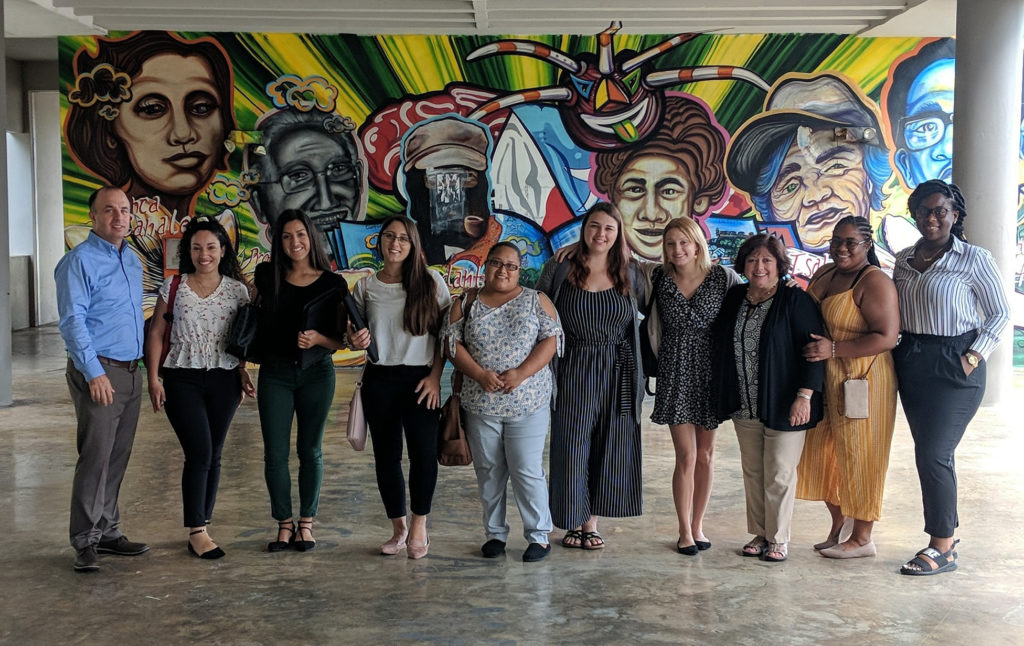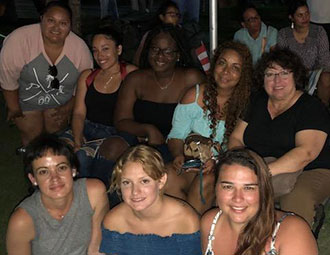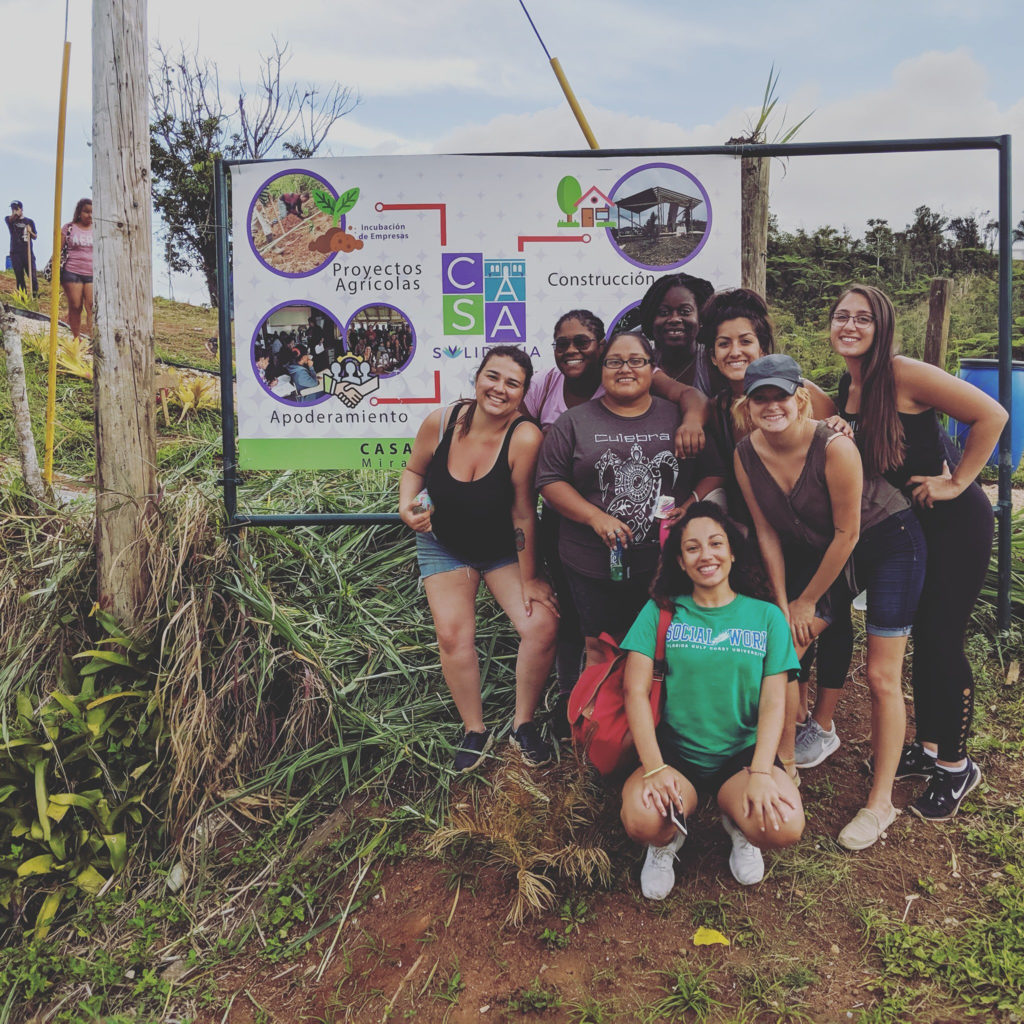
Two years after Maria slammed into Puerto Rico as a Category 4 hurricane, the 10th strongest Atlantic storm on record, islanders continue to struggle rebuilding their lives, their communities and their country.
Maria destroyed roughly 80 percent of Puerto Rico’s agricultural industry, killed nearly 3,000 people and wiped out electricity to the majority of the island’s almost 1.6 million residents. Schools closed and hospitals lacked the resources needed to treat the sick and injured.
This past summer, a group of Florida Gulf Coast University faculty and students learned about the challenges firsthand and pitched in to help while researching how social workers assist communities and individuals in the wake of catastrophes like Maria. Lirio Negroni, associate professor of social work, and Tom Felke, associate professor and program chair of social work, led eight FGCU students on the journey as part of an elective study-abroad course, “Social Work Practice with Latinos/as Coping with the Impact of Natural Disasters.”
Their objective was two-fold: to explore contemporary issues and needs of families and communities dealing with the impact of hurricanes Irma and Maria; and to use the insights gained to positively impact their work with Latinos in Southwest Florida. The research was conducted in partnership with the University of Connecticut School of Social Work and the University of Puerto Rico Beatriz Lasalle School of Social Work.
Research trips of this nature are typically open only to graduate students, but Negroni and Felke welcomed social work undergraduates, all at the end of their junior year.
“Our students are ethical, responsible and committed,” Negroni explained, “and interested in personal and professional growth.”
Students met with professionals and community leaders, visited numerous agencies and interacted with local people. They learned about Puerto Rico’s history, culture, ecosystems and colonialism; they attended social work practice conferences and learned about how professionals in their field responded in the aftermath of Hurricane Maria.

One of the more meaningful experiences, they said, involved a one-day service project in the central mountain municipality of Orocovis at Casa Solidaria (Solidarity House), which has been helping with housing recovery since Hurricane Maria. This is a community where practically all homes were destroyed, and minimal help had arrived.
“Solidarity House focuses on agricultural capabilities,” said Hannah Arteaga, one of the students on the trip. “They aim to make communities aware of how to grow their own crops, so they are not dependent on spending money elsewhere and, also, to teach the youth of the importance of agriculture.”
Students pitched in wherever they were needed.
“They worked with residents, volunteers and social work staff,” said Negroni. “They cleaned up, weeded and built pathways up and down the hills to make the area safer to walk around and prepare the soil for planting.”
It was, perhaps, the day of service that brought together all the elements of their journey, in an academic, social and practical sense.
“To be able to go on a study abroad trip and not only gain so much perspective and knowledge, but also to give back and contribute is what made this day of service special,” Arteaga said.
Students also had opportunities to observe the differences in social work as practiced in Puerto Rico compared to mainland United States.
“In Puerto Rico, students saw firsthand how to work with communities and critically evaluate the impact of social policies,” Negroni said. “As a result, these students have come back with ideas of how they might better work with Latinos/Latinas here in Florida.”
Maria Jimenez-Sebastian agreed: “I believe the knowledge and experience I gained from this trip will help me in my future career. When working with Puerto Rican clients here, I will be able to understand their background and, more importantly, their culture.”
Seeing the devastation and recovery efforts with a policy-focused perspective was enlightening for student Mariana Mackinnon.
“I think seeing how misunderstood the archipelago was by mainstream media in the aftermath of Maria is what impacted me the most on both a personal and professional level,” she said. “The most popular news outlets in the United States headlined stories that highlighted the resilience of people who had no choice but to be resilient in the face of such neglect. I feel blessed to have had my eyes opened to this. Learning how impactful a heavily biased media message can be was my greatest takeaway.”
Arteaga would agree. Puerto Ricans, she said, did not receive the necessary funding and much-needed help from the government.

“Yes, they were resilient, but they had no choice and had to help themselves as best they could,” she said. “I became aware of how easy it is not to dig deeper into stories covered in the media.”
In that same vein, student Samantha Ackerson reflected on an incident when ferry service to mainland Puerto Rico was disrupted at Vieques, a small especially hard-hit island municipality. Media coverage was dismissive, she said, and claimed that the ferry was providing full service. The fact that this was the only mode of transportation for people traveling to school, work and for health care from the small island to the main one seemed to be of no consequence to the media, she said.
Later, Ackerson said, the students discussed the correlation between “how the United States treats Puerto Ricans as second-class citizens and how mainland Puerto Rico treats the people of Vieques as third-class citizens … I guess my takeaway is how contagious oppression can be, especially when nobody stands up to help the oppressed fight against their oppressors.”
While Arteaga and Ackerson pondered the role of media in influencing action or non-action, the deep commitment of social work professionals impressed classmate Andell Napoleon.
“Listening to their passion and hearing their drive to keep going,” she said, showed her “what I need to do to continue in the field.”
Exposure to the big picture also made a lasting impression on Ackerson, who experienced macro social work, or large-scale advocacy and policy practice, firsthand for the first time. Prior to this, Ackerson’s attention was focused more on micro social work or practice with individuals, families and groups.
“This trip enhanced my understanding of how important macro social work is,” she said. “I had the textbook understanding, just not the firsthand experience. Though I plan to pursue a career in micro social work, I will keep tabs on, and be more active in, macro social work.”
The experience brought to Ackerson’s mind a Chinese proverb: “Give a man a fish and you feed him for a day. Teach a man to fish and you feed him for a lifetime.” But she heard a different take on the adage during her trip.
“A professor from the University of Puerto Rico explained to us that its meaning is way deeper than that,” she said. “We must ask the ‘social questions’: ‘Where are the fish? Do the people want fish? What if there are no fish? Why are there no fish?’ By thinking critically about circumstances, we will only help our clients more.”